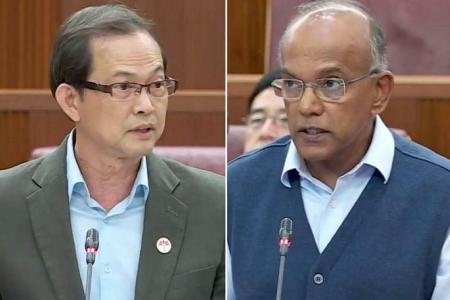Shanmugam vs Leong Mun Wai: What was said in Parliament
On Wednesday, Law and Home Affairs Minister K. Shanmugam raised questions in Parliament about Progress Singapore Party Non-Constituency MP Leong Mun Wai’s conduct.
It sparked a heated exchange between the two. Here are excerpts:
1. On whether Mr Leong agreed that the Court of Three Judges and disciplinary tribunal (DT) had said that Mr Lee Hsien Yang and Mrs Lee Suet Fern had lied under oath:
Mr Shanmugam: I asked a question, I’m sure the Member can have plenty of time to ventilate at the end. I asked a simple question: Does he agree that the Court of Three Judges and the DT have said that Mr Lee Hsien Yang and Mrs Lee Suet Fern lied on oath, that’s all. If the Member can give me an answer, he can give it to me. If he can’t, we will move on.
Mr Leong: I think it is subject to legal interpretation.
Mr Shanmugam: Would the Member accept that if they did lie on oath, that that is possible criminal conduct?
Mr Leong: Speaker, sir, that’s why this whole issue is not about “if”. It’s about (sentence not completed).
Mr Shanmugam: Point of order again, sir. Member can talk about what he wishes at the end. My question is a simple one: If they lied on oath, is it possible criminal conduct?
Mr Leong: Speaker, can I say that I’m not going to answer the minister like answering in court. This is a legislative Chamber. This is not a legal chamber. I have my way of answering.
2. On Mr Leong’s remarks that the individuals in the Keppel Offshore & Marine (O&M) case were “actually guilty”:
Mr Shanmugam: The Cambridge dictionary definition of guilty is responsible for breaking a law. So, sir, I will now invite Mr Leong, through you, to either substantiate his statement that they are all guilty or withdraw his statement. One cannot, under the cloak of parliamentary privilege, make these sorts of statements about people. And if he does not withdraw, then, sir, we will consider what else needs to be done.
Mr Leong: When I say these individuals are guilty, (because) this is based on the information that we’ve obtained about what happened overseas, in the overseas jurisdiction... We know that the CPIB (Corrupt Practices Investigation Bureau) decided not to prosecute them. But, at the same time, we also want to know... when a stern warning letter is issued, does it mean that there is actually sufficient evidence to show that they are guilty, but there are some reasons that the CPIB decides not to prosecute them?
Mr Shanmugam: I raise a point of order. I’d asked a simple question: Is the Member saying they have been found guilty, all of them, in any court of law? Or is he otherwise prepared to withdraw his statement? That’s all I’ve asked. If he says he’s not prepared to withdraw, we leave it and we follow up.
Mr Leong: I have the impression that they are found guilty in the overseas court of law.
Mr Shanmugam: Can I know what is the basis on which the Member says that he is under that impression that they have all been found guilty?
Mr Leong: This is based on the case having been such a big case overseas and in Singapore, and Keppel Corp has paid such a big fine (sentence not completed).
Mr Shanmugam: Can I suggest that the Member works a little bit, finds out what he is talking about, before coming here and making serious allegations. If I were to tell him that his statement is false, it is untrue to say they have all been found guilty elsewhere – certainly not in Singapore – is he prepared to withdraw his statement?
Mr Leong: Speaker, if the minister says that they have not been found guilty overseas, then I’m prepared to withdraw my statement.
Mr Shanmugam: Well, for the record, one person pleaded guilty in the United States. To the best of my knowledge, no one else has been found guilty. And it is a very serious statement to come here, make allegations without doing your homework, and then propagate this sort of stuff all over the place. Really unparliamentary and not acceptable. And then to say, “well, I read”, “it seems to be big”, unfortunately, this is a thread running through all of Mr Leong’s statements. He doesn’t do his homework, he doesn’t check, he just says all sorts of things. And that is not the way debates ought to go. I’m glad Mr Leong has withdrawn that statement.
3. On Mr Shanmugam’s question as to why Mr Leong felt the Parti Liyani case was not relevant and was being used to confuse Parliament:
Mr Leong: Speaker, I didn’t say it is not relevant. I said it muddies the water.
Mr Shanmugam: Sir, through you, can I ask: When you say a case is used to muddy the waters, what you’re saying is: It is not relevant, and it’s used to confuse Parliament. That is, in essence, what “muddy the waters” means. So, I want to ask through you, sir, again, does Mr Leong accept that the Parti Liyani case is relevant?
Mr Leong: Speaker, I do not accept that the Parti Liyani case is relevant for this debate. Because the issue here is about the fairness of the Keppel O&M case and the Lee Hsien Yang case. So you don’t need to bring in a new case. When you bring in a new case, in a way, you’re clouding the thinking of people. I didn’t say it’s irrelevant. I didn’t say you’re confusing Parliament. Minister, don’t put words into my mouth.
Mr Shanmugam: Sir, may I ask what is the meaning of “muddy the waters”?
Mr Leong: Speaker, now Minister is testing whether I’m from a lousy school or not.
Speaker Tan Chuan-Jin: You made a Facebook post about muddying waters and I think Minister is asking what exactly do you mean. And there’s no allegation about what school you come from. I’m sure you’re from a very good school.
Get The New Paper on your phone with the free TNP app. Download from the Apple App Store or Google Play Store now



